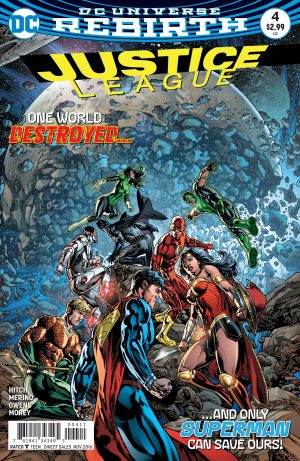Review: Justice League #4
When I was in college, there was this one professor with a nightmare of a reputation when it came to grading. If you were lucky you might get a C. If you were blessed by God, you’d get a B. The people who got A’s though? They didn’t exist. It didn’t happen. The justification for this whole process was that he wasn’t grading you based on a rubric, no; he was grading you against yourself. In theory, this was to punish you for your bad habits in your essay writing, to put a stop at the points where you get lazy. In reality, however, it was putting a lot of undue stress on students that are only here because the philosophy class fits in their schedule.
If I was scoring Justice League #4 based on how it’s improved against itself, I’d be giving this issue a 5/5. That’s right, ladies, gentlemen and other, the Justice League is finally finding its footing.
When the run began with all its explosions and crumbling cities, the biggest question I wanted to know was: where’s the emotional context. Why does any of this global destruction actually matter to these characters?
Here we get it. Superman’s at the earth’s core trying to destroy these vague devices that’ll crack the planet in half. The heat’s too intense, he’s not strong enough to survive but he knows that if he fails, his wife and child die. These are people that mean the world to him and who he willingly abandoned his universe with in order to protect. He can't fail. He won't let himself.
 At the same time, his wife Lois chews out Batman as she watches him heartlessly assume her husband’s death and move on. She brings to question an emotional theme I wanted to see addressed since issue #2—just how far are the Justice League willing to trust this new Superman?
At the same time, his wife Lois chews out Batman as she watches him heartlessly assume her husband’s death and move on. She brings to question an emotional theme I wanted to see addressed since issue #2—just how far are the Justice League willing to trust this new Superman?
So we have an emotional core established and then the artistic team behind this book then finally starts answering the vague questions about the villains and their disjointed nature. From the start, there seemed to be two distinct threats. The red-dialog hivemind of humans and these strange space bugs crashing onto earth. Their presences were at the epicenter of the devastation yet their visual appearances were alien to each other. Well, that's because they're not the same threat. They're two independent forces at war with each other.
This was one of two plot turns in the issue that made sit up and say, “Wait what?” This story’s been so vague and loose with any plot context gives substance. A definition to the conflict gives story's their dramatic theme and maybe after all this time the Justice League can finally start becoming a genuine story.
I don’t think I’ve ever seen such a course correction in a comic before. This was almost like the writer took-in the feedback and reception and started addressing those complaints. As unlikely as it is, I’m seeing all these elements I wanted finally falling in place and it's making the book better.
That’s not to say all this I’ve written above isn’t delivered as clunky as possible. The Justice League are barely even side characters in a book titled Justice League as they pop in and out of the story at random points to see the things happen, drop a line of exposition and then bounce.
As much as I’ve praised the element of Superman and his family, it’s a snapshot of a few pages in the entirety of the issue and not even one that wholly makes sense. When Lois is rightfully yelling at Batman, he’s stone-faced and aloof—we don’t know his answer when we should. If this was Superman solo book, this would be fine—narratively even make sense. Only this is the Justice League. Batman should be a main character in the Justice League and together they should be actually exploring their current perceptions and tensions instead sending the concerns out and into the void.
The Justice League members still work like ciphers. They’re here to receive and output the information that the rest of the comic throws at them. They don't really matter as characters to the story. Any hero could be here and as long as they had the right super power, it'd go the same.
With Justice League #4 we’re finally getting emotional grounding, we’re getting information that gives us something as readers to hold on to but the biggest damnation I could give the issue is that it’s providing these things four issues into the current arc. Things that should have always been here are only showing up now and what they're providing feels almost wasted on the story being told as collected whole.
The villains and details are still vague and the stakes still cartoonishly high with a team that are each separated and so far flung that the fact they’re even in a team together barely matters. But the comic is getting better. Not great, maybe even barely good but it’s brought me back to where I was saying in the review for issue #1: that the next issue could build on these elements and make a good story.
Only this time it might actually happen.
[su_box title="Score: 3/5" style="glass" box_color="#8955ab" radius="6"]
Justice League #4 Writer: Bryan Hitch Artist: Tony S. Daniel Colorist: Tomey Morey Publisher: DC Comics Price: $2.99 Format: Ongoing; Print/Digital
[/su_box]
